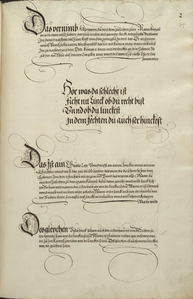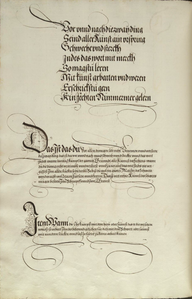|
|
You are not currently logged in. Are you accessing the unsecure (http) portal? Click here to switch to the secure portal. |
User:Kendra Brown/Latin Lew/81v
Jump to navigation
Jump to search
Munich 81v / PDF page 8
Contents
Missing zettel verses from PHM Dresden 85r (7)
German
- Hör was da schlecht ist
- ficht nit Linck ob du rech bist
- Vnnd ob du linckest[^1]
- In dem fechten du auch ser hinckest
English
- Listen what is bad.
- Do not fight left if you are right [handed].
- If you con someone in fencing,
- you also go astray vastly.
Notes
- [^1]linken/links//lenken
- lenken: to take a direction from one side
- linken: to fall, collapse, sink down
- links: left side/handed
81v a
81v a Latin (Sandbox)
- **Quum** perveneris ad hostem propius,
- si dexter sis feriundo,
- strenue athleticum exercitium exercere cupiens,
- a sinistro latere primum ictum nunquam regas.
- In firmior .n. [enim] est,
- quam ut hosti resistas in collisione ensium,
- verum si de dextro ferias,
- tum firmiter poteris resistere,
- atque varios habitus[^1] exercere.
81v a English (Sandbox)
- When you have arrived closer to the enemy,
- If you are striking right[^2]
- you want to strenuously practice the exercises of athletics
- At no time direct the first cut from the left side.
- it is indeed weaker,
- than while you resist the enemy in the striking together of swords,
- truly if you strike from the right side,
- then you can stoutly resist,
- and practice various skills.
81v a Notes
- [^1]: 'habitus' is the equivalent of 'arbeit', or the general work of fencing.
- [^2]: 'dexter' seems to reflect the punning nature of 'gerecht', which is both correct, right, on the right side.
- The German has a bunch of information that is missing from the Latin.
- Which is information about *why* you would do this.
- However, the Latin is more specific about handedness when discussing the left hand.
- Grimm: Link
- \3) link ist der, welcher mit der linken hand das verrichtet, was gewöhnlich mit der rechten gethan wird (verschieden von no. 7 unten): linker, der die linke hand für die rechte braucht,
- Link is the person, who accomplishes with the left hand, what is usually done with the right hand. (diff. from no 7 below): linker is the person who uses the left hand for the right.
81v b
81v b Latin (Sandbox)
- **Sin** autem sinistra manus dextra sit agilior,
- etiam tunc primum Ictum de latere dextro non feries,
- at potius de sinistro.
81v b English (Sandbox)
- But if, however, the left hand is more dexterous than the right,
- Then also do not strike the first strike from the right side,
- But preferably from the left.
81v b Notes
- Translating both ictus (noun) and feries (verb) as "strike" is a little weird, since they're not at all the same in Latin, but this is only really a problem when they're both in the same sentence.
- Note that 81v a says "more skillful striking from the right" where 81v b says "if the left hand is more dextrous than the right"
- Could these distinctions about handedness be about but the mechanics your opponent can interact with rather than the strength of the strike itself? see "you can stoutly resist"
- DMLBS may support the idea that indes could come from intus:
- Grimm suggests interea as a Latin translation for indes
- https://logeion.uchicago.edu/interea
- Grimm: http://woerterbuchnetz.de/cgi-bin/WBNetz/wbgui_py?sigle=DWB&mode=Vernetzung&lemid=GI00336#XGI00336
- als temporales adverb, das innerhalb einer vorher genannten zeit geschehene zu bezeichnen
- As a temporal adverb, which designates an occurrence within a previously mentioned time
Missing Zettel verses from PHM Dresden 85v (8)
German
- Vor vnnd nach die zwaÿ ding
- Seind aller Kunst ain vrspring
- Schweche vnd sterckh
- Indes das wort mit merckh
- So magstu leren
- Mit kunst arbaiten vnd weren
- Erschrickstu gern
- Kain fechten Nimmer mer gelern
English
- Before and after, these two things
- are the origin of all art
- Weak and strong
- and with [them] note the word Indes
- This way you can learn
- to work and defend artfully.
- If you are easily scared/spooked [(implied) by hard work/study/learning],
- then you will never learn fencing
81v c
- So the Latin translator noped out of indes, before, after, strong and weak here (even though later in the text he is willing to work with everything but indes).
- Latin 81v-c (8c) does not match german 85v-b at all-- line 2.5-5 might match 85v-c (item wann du ehe...) and line 6 onward might match 86r-a
81v c Latin (Sandbox)
- In gladiatoria optimum est,
- ut observes, quo hostem feriundo praevenias,
- id si feceris,
- omnes habitus quos exercere voles,
- contra eum continuo usurpato.
- Ut is cogatur subinde se defendere[^1].
- Verum si is te praevenerit Ictibus exercendis,
- prima cura sit,
- ut acriter ense te defendas[^2],
- et ea ratione ipsius conatum in nihilum rediges.
81v c English
- In fighting it is best,
- in order to observe, when you come earlier than the opponent with striking,
- If you use "it",
- all the skills which you want to practice,
- continuing to use against him
- in order that HE would have been immediately forced to defend himself.
- Truly if HE comes earlier than you in carrying out the strike,
- the first concern would be,
- to defend yourself sharply with the sword,
- and using this method, reduce his attempt into nothing.
81v c Notes
- [^1]: defendere/defendas used as a general, non-specific work around for 'versetzen'.
- [^2]: 'ense te defendas' used as a general, non-specific work around for 'mit Versatzung', or with/using a stance/guard/counterposture.
- 3, 5, 4: If you do/cause IT, continue to use any of all the things you want to do against him
- "coges" appears above when (in translated german) you "force him so he must set aside"; cogatur is a passive form of the same verb
- "gladiator" appears after this point, meaning something like "fencer," but in forms meaning "fencing" it seems to only appear on this page and the one before it.
- in addition to indes, the latin scribe has noped out on before/after too-- line 4 is a not-very-close paraphrase of the final clause of german
- german has two mentions of versetzen; latin has one defend. this has the result that the latin elides the existence of strikes that don't require defense (eg, out of range)
- "prima cura sit" is weird-- there's nothing like it in the german but also it's oddly specific
- It does have the teacherly vibe of some of the other German, bedenken, beobachten, etc, but just not here.
- Latin scribe also completely missed the profoundly parallel pair of paragraphs in the German (when you preempt him/when he preempts you) - Latin provides only a pair of praevenire
81v d
81v d Latin (Sandbox)
- **Locus** vel pars ensis firmior is dicitur,
- qui continetur a cruce ensis usque eius medium,
- infirmior vero a medio ad mucronem usque porrigitur,
- quo autem modo eas partes exercere te oporteat,
- in sequentibus declarabitur.
81v d English (Sandbox)
- The place or the part of the sword is called stouter,
- which is contained from the cross of the sword up to its middle,
- weaker truly is extended from middle up to the point,
- to which purpose it is proper for you to exercise these parts using the method
- It will be indicated in the following
81v d Notes
- Two phrases for one concept; not in German: locus or pars


